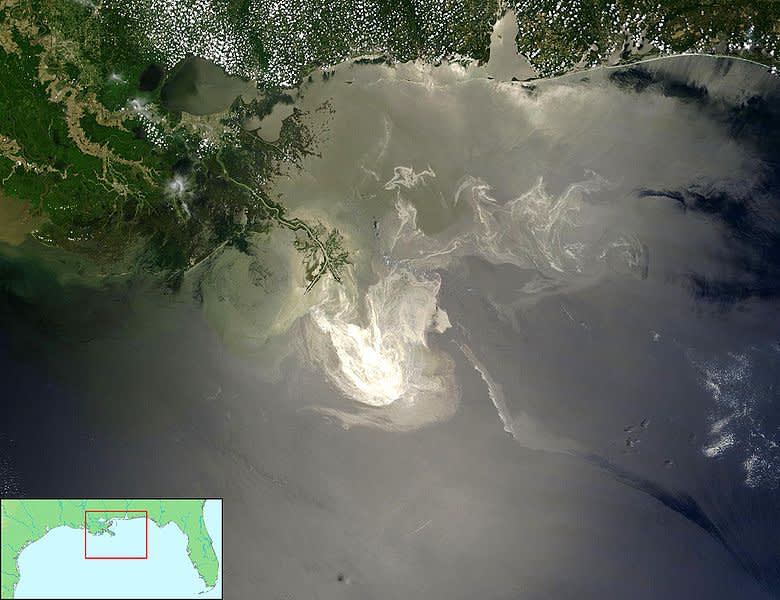Transocean to Pay $1.4 Billion for Deepwater Horizon Disaster, NFWF to Benefit
Benjamin T. Lambright 01.23.13

The Deepwater Horizon was a deepwater, offshore oil drilling rig in the Gulf of Mexico which was owned by Transocean, a Swiss-based company that remains one of the world’s largest off shore drillers, when an explosion on the rig killed 11 crewmen and caused a fire that could not be extinguished until two days later. The rig subsequently sank on April 22, 2010, opening an oil well and beginning what would become the largest offshore oil spill in United States history.
A total discharge of as many as 4.9 million barrels of oil spewed into the Gulf of Mexico and covered 580 square miles by the time the well was permanently sealed on September 19, 2010.
Eight U.S. National parks were threatened or impacted by the spill. Thousands of animals have died as a result of the spill, including many from threatened and endangered species. And, according to Yahoo news, “horribly mutated” marine animals have begun showing up Gulf Coast waters. While the FDA insists that food from the Gulf is safe to eat, deformed crabs, eyeless fish, and tumor-ridden shrimp are more than disconcerting for the average consumer or sport fisherman.
Prior to the spill, one-tenth of 1% of Gulf fish were found with lesions or sores. A report done by the University of South Florida found areas of where up to 20% of fish had lesions.
Scientists warn the complete range of effects to wildlife may not be seen for years, perhaps even decades.
The U.S. Government found that British Petroleum was at primary fault for the spill, caused officially by defective cement work, and BP has paid in excess of $5 billion dollars to date and could pay as much as $21 billion in damages before all claims against the company are settled.
However, the U.S. also found Transocean at fault and today the company has agreed to plead guilty to, according the US Department of Justice, violations of the Clean Water Act (CWA) and to pay $1.4 billion dollars in civil and criminal penalties.
From a US DoJ press release:
“Transocean’s rig crew accepted the direction of BP well site leaders to proceed in the face of clear danger signs — at a tragic cost to many of them,” said Lanny A. Breuer, Assistant Attorney General for the Justice Department’s Criminal Division. “Transocean’s agreement to plead guilty to a federal crime, and to pay a total of $1.4 billion in criminal and civil penalties, appropriately reflects its role in the Deepwater Horizon disaster[…]
“The civil settlement secures $1 billion in civil penalties for violations of the CWA, a record amount that significantly exceeds last year’s $70 million civil penalty paid by MOEX Offshore 2007 LLC, a 10 percent partner with BP in the Macondo well venture. The unprecedented $1 billion civil penalty is subject to the Resources and Ecosystems Sustainability, Tourist Opportunities and Revived Economies of the Gulf Coast States Act of 2012 (Restore Act), which provides that 80 percent of the penalty will be to be used to fund projects in and for the Gulf states for the environmental and economic benefit of the region. This civil resolution reserves claims for natural resource damages and clean-up costs.”
Much of the “80 percent of the penalty will be to be used to fund projects in and for the Gulf states for the environmental and economic benefit of the region.” Other allocations will find their way into the hands of national conservation organizations like the National Fish and Wildlife Foundations (NFWF), which has announced they will receive more than $2.5 billion to fund conservation projects in and around the gulf. One-hundred fifty million dollars of that $2.5 billion will come from the Transocean settlement.
The NFWF already has over 60 projects aimed at restoring or benefiting the gulf coasts and its inhabitants. These projects range from the distribution of alternative fishing gear to commercial fishermen in order to reduce the accidental catch of at-risk species to critical care for injured seabirds and oyster shell recycling programs.
While one aspect of the case against Transocean is finished, and the funds will soon be distributed to conservation organizations that desperately need them, a criminal case is still pending against Transocean and is being prosecuted by members of the Deepwater Horizon Task Force.

